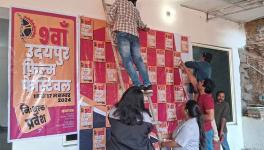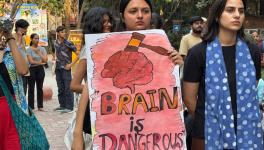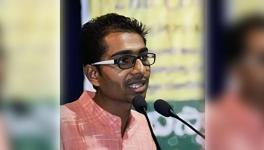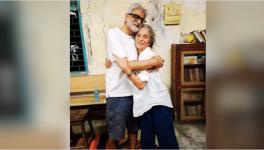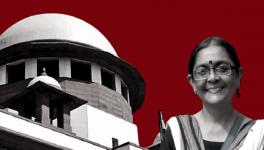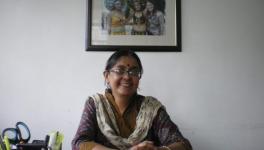Bhima Koregaon Case: Relatives of Accused Flag Prison Authorities' ‘Criminal Negligence’ and Deteriorating Health of Undertrials
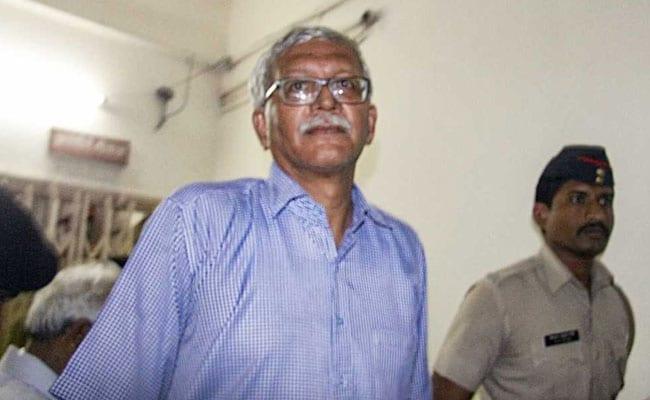
Vernon Gonsalves.
The relatives and representatives of the accused persons in the Bhima Koregaon case have released a statement drawing attention to the deteriorating health of several undertrials – including Vernon Gonsalves – and the brazen negligence of the prison authorities.
Gonsalves, who has been reportedly ill since August 30, has managed to get proper medical treatment only after his wife and lawyer approached the court and obtained an order.
The statement says: “Both international treaties and prison manuals in India are clear about the fact that prisoners have the unalienable right to health care, including the right to not contract diseases in prison. However, the overcrowding of prisons in India, mainly due to the high number of undertrials, has led to prisons becoming hazardous to the life and health of their inmates. In addition to this, we see prison authorities behaving with absolute impunity by refusing to accord treatment in time, thereby leading to severe complications in many sick prisoners, and often, even death.” It should be noted that 84-year-old Jharkhand-based tribal rights activist Father Stan Swamy – another accused in the Bhima Koregaon case – died following delayed treatment while he was a prisoner.
The relatives and representatives of the accused in the case have also demanded the immediate release of political prisoners “who are languishing in jail as undertrials for years”. “If the state is incapable of guaranteeing their safety and security in prison, it would be better that the courts intervene to grant bail to these political prisoners, so that their precious lives are saved,” read the statement.
Read the full statement below:
In yet another act of criminal negligence, the prison authorities of Taloja Central Jail, Maharashtra, have delayed medical treatment for Vernon Gonsalves, a prominent activist and one of the accused in the Bhima Koregaon - Elgar Parishad case.
Gonsalves, who is 65 years old, fell ill with fever on August 30th, and even though his condition was steadily deteriorating, he was treated with just paracetamol and antibiotics in jail, for almost a week. After much pleading, he was taken to JJ hospital on September 7 and was given oxygen support. However, instead of continuing his treatment, he was callously brought back to jail where his condition continued to worsen. It is only after his lawyer and wife, Susan Abraham, approached the court and obtained an order, that the prison authorities finally admitted him to the emergency ward of JJ hospital, where he is still under treatment. What is even more concerning here is that it was barely a month ago that the NIA court had denied mosquito nets for the Bhima Koregaon accused in a petition by Gautham Navlakha.
Both international treaties and prison manuals in India are clear about the fact that prisoners have the unalienable right to health care, including the right to not contract diseases in prison. However, the overcrowding of prisons in India, mainly due to the high number of undertrials, has led to prisons becoming hazardous to the life and health of their inmates. In addition to this, we see prison authorities behaving with absolute impunity by refusing to accord treatment in time, thereby leading to severe complications in many sick prisoners, and often, even death. Though VIP prisoners are often given preferential treatment in Indian jails, it is often the underprivileged and the political prisoners, who are subjected to such inhuman conduct.
In the Bhima Koregaon case itself, it has barely been a year since Father Stan Swamy, prominent activist and priest, passed away while still a prisoner, after being denied prompt treatment following Covid. Similarly, it was only very recently that we heard the shocking news of the death of Pandu Narote, a 33-year-old Adivasi man in Nagpur jail where he was convicted under various UAPA charges for having Maoist links. Narote’s lawyer has also alleged that his death was caused due to gross negligence by the prison authorities.
We are also witnesses to the disturbing case of PhD scholar Atiqur Rahman, who was arrested on his way to Hathras, after the brutal rape of a Dalit woman in 2020. Rahman was allowed to undergo heart surgery in AIIMS only after much campaigning and a court order, and yet was not allowed proper post-operative care. Today his left hand has been paralyzed and his family and lawyers are struggling to get him bail for further treatment.
Similarly, it is only very recently that 7 human rights organisations including Amnesty, had come out with a statement on the deteriorating condition of Dr G N Saibaba, who is suffering from multiple ailments such as a heart condition, a cyst in the brain, breathing problems and hypertension, most of which need specialists’ attention, which is not being provided by the jail authorities.
More importantly, it should be noted that the superintendent of Taloja prison, who delayed treatment to Vernon Gonsalves, is the same official who was in charge when Kanchan Nannavare who was arrested for Maoist links, died after a brain surgery, which was conducted on her, without informing her husband, who is also a political prisoner, lodged in a Pune prison.
In the Bhima Koregaon case too, Varavara Rao, the famous Telugu poet and activist, was also subject to inhuman treatment in jail where he was denied proper medical care in spite of his age and various, serious ailments. It was only last month that he could acquire medical bail from the supreme court.
Other political prisoners in the Bhima Koregaon case, have also been systematically denied medical treatment. Last year, Dr Hany Babu, the 12th accused in the case, contracted an extremely serious eye infection after covid and his lawyers and family had to approach the courts to ensure proper treatment. Even today, he suffers from blurred vision due to an increase in power, for which he needs to be checked, and the prison authorities have not yet allowed it.
Gautam Navlakha, a prominent activist and journalist who was also arrested in the Bhima Koregaon case is also being denied proper checkups for his dental treatments, allergy attacks and skin rashes. More worryingly, Navlakha who is supposed to undergo colonoscopy every two years has not been taken for the same, though he is at high risk for stomach cancer, due to his family history and the presence of polyps in his colon. He was also denied his medical records despite a court order.
It is the primary responsibility of the state, the courts, and most importantly, the prison authorities, to take care of the health and life of the inmates who are under their custody. Yet, as per the National Crime Records Bureau, thousands of prisoners perish in Indian jails, with simple infections turning to septicemia and curable fevers leading to fatalities as in the case of Pandu Narote.
Various judgements in the higher courts of India, have time and again reiterated the fact that prisoners cannot be denied their fundamental rights just because they are imprisoned. In fact, in the prominent case of Parmanand Katara Vs Union of India (1989 AIR 2039), the Supreme Court had maintained that the state is obliged to take care of a prisoner’s life whether he is deemed guilty or innocent, as the per the right to health, which is a fundamental right given to all Indian citizens, in Article 21 of the constitution. In spite of this, the state and its prisons in India, are making a mockery of our constitution and courts, by acting in a most irresponsible manner, when it comes to the life and health of prisoners.
Today, our prisons are killing fields, where the poorest of the poor perish without prompt treatment and where prominent political prisoners have to move court for a right that is guaranteed to them by the constitution. We strongly condemn this state of affairs and demand that proper action for criminal negligence is taken against all those officials who are responsible for the death of prisoners in jail. We demand that compensations are provided for the families of such prisoners and we also demand action against those officials who are responsible for the death of Kanchan Nannaware, Father Stan Swamy and Pandu Narote.
We demand that the state immediately and urgently intervene in the functioning of prisons so as to ensure speedy treatment for all prisoners, thereby preventing complications and death. We also demand speedy treatment for political prisoners such as Dr G N Saibaba, Atikur Rahman, Gautham Navlakha and Dr Hany Babu.
Given that the overcrowding of prisons, and shortage of staff to provide escorts is one of the main reasons that is leading to such negligence regarding the health of prisoners, we demand that a mechanism is set in place for providing speedy bail to the undertrials who fill Indian prisons.
We also demand the immediate release of political prisoners who are languishing in jail as undertrials for years. If the state is incapable of guaranteeing their safety and security in prison, it would be better that the courts intervene to grant bail to these political prisoners, so that their precious lives are saved.
[Signed by]
Susan Abraham (Vernon Gonsalves)
Jennifer Ferriera (Arun Ferriera)
Roy Wilson (Rona Wilson)
Pranali Parab (Ramesh Gaichor)
Minal Gadling (Surendra Gadling)
Rama Ambedkar (Anand Teltumbde)
Sahba Hussain (Gautam Navlakha)
Sharad Gaikwad (Sudhir Dhawle)
Monali Raut (Mahesh Raut)
Fr. Joe Xavier (Fr. Stan Swamy)
Dr. Jenny Rowena (Hany Babu)
Surekha Gorakhe (Sagar Gorkhe)
Get the latest reports & analysis with people's perspective on Protests, movements & deep analytical videos, discussions of the current affairs in your Telegram app. Subscribe to NewsClick's Telegram channel & get Real-Time updates on stories, as they get published on our website.









